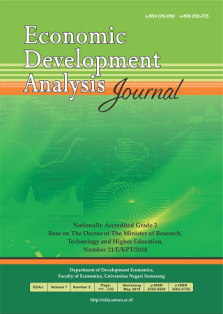The Impact of Health on Per Capita GDP in Indonesia
Abstract
The purpose of this study was to estimate the influence of health on per capita GDP in Indonesia in 1986-2018. Health was proxied by three variables including health expenditure, infant mortality rate and life expectancy. The variables expressed a significant indicator to assess health level in a country. Furthermore, the estimation was carried out in the short-run and long-run based on the ARDL-ECM model. The results showed that the feasible ARDL model was ARDL (2, 0, 0, 0). In long-run, per capita GDP was significantly influenced by health expenditure, infant mortality rate and life expectancy. This expressed significant implication of the health level for increasing the economic performance and welfare in Indonesia. Meanwhile, in short-run, it was only influenced by infant mortality rate and (ECT (-1)). Further, Cusum and CusumQ tests showed the empirical model was stable. The policy implication directs that the government can improve the quality of public health, increase health expenditure as a fiscal stimulus, and support increasing public income.


